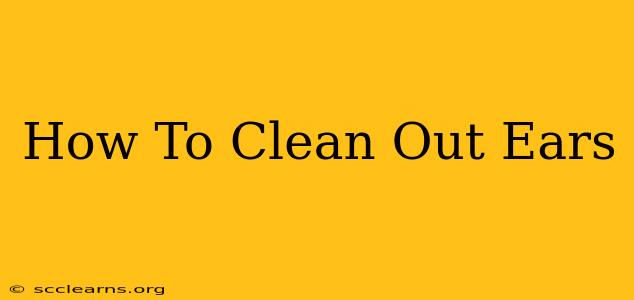Cleaning your ears might seem straightforward, but improper techniques can lead to more harm than good. This comprehensive guide will teach you how to clean your ears safely and effectively, ensuring healthy ear canals and preventing potential problems.
Understanding Your Ears: Why You Shouldn't Use Cotton Swabs
Before we dive into cleaning methods, it's crucial to understand the anatomy of your ear. The outer ear collects dirt, dust, and other debris. Your ear naturally cleans itself through the process of migrating earwax (cerumen) which traps and carries away these impurities. The problem with cotton swabs (Q-tips) and other similar instruments is that they push this wax further into the ear canal, potentially impacting your eardrum and leading to:
- Impacted earwax: This can cause hearing loss, earaches, itching, and even infections.
- Ear canal injuries: Scratching or puncturing the delicate skin inside your ear canal can lead to bleeding, infection, and even permanent damage.
- Eardrum perforation: Pushing a swab too forcefully can rupture your eardrum, a serious condition requiring medical attention.
Safe and Effective Ear Cleaning Methods
Instead of using cotton swabs, try these safer and more effective methods:
1. Let Your Ears Clean Themselves: The Power of Natural Exfoliation
The best way to clean your ears is often to let them clean themselves. Your body's natural process of earwax migration usually handles the job adequately. Avoid unnecessary intervention unless you experience symptoms of impacted earwax.
2. Warm Water Irrigation: A Gentle Rinse
If you do need to remove excess earwax, consider ear irrigation. This involves gently flushing your ear canal with warm water. However, it's crucial to:
- Use lukewarm water: Avoid hot water, which can scald your ear canal.
- Use a bulb syringe: These are available at most pharmacies and are designed for gentle irrigation.
- Tilt your head: Tilt your head to allow the water to flow out easily.
- Consult a doctor: If you're unsure about this method or have any concerns, consult an ENT specialist. Improper irrigation can worsen existing problems.
3. Hydrogen Peroxide (With Caution): A Potential Aid
Some people use a diluted solution of hydrogen peroxide to soften earwax. Never put undiluted hydrogen peroxide in your ear. Dilute it with an equal amount of water and only use a small amount. Allow it to sit briefly before gently rinsing with warm water. Always consult your doctor before trying this method.
4. Professional Ear Cleaning: When to Seek Help
If you experience symptoms like hearing loss, persistent earaches, or excessive earwax buildup that doesn't respond to home remedies, it's crucial to consult an ear, nose, and throat (ENT) doctor. They have the tools and expertise to safely remove impacted earwax and address any underlying issues.
Recognizing Signs of Impacted Earwax
Pay attention to these common symptoms of impacted earwax:
- Hearing loss: A muffled or decreased ability to hear.
- Earache: Pain or discomfort in the ear.
- Itching: An irritating itch inside the ear.
- Feeling of fullness: A sensation that your ear is blocked or full.
- Ringing in the ears (tinnitus): A persistent ringing, buzzing, or whistling sound in your ears.
Conclusion: Prioritize Ear Health
Keeping your ears clean and healthy is crucial for your overall well-being. By understanding your ear's natural cleaning process and avoiding harmful practices like using cotton swabs, you can maintain optimal hearing health. Remember that when in doubt, always consult a healthcare professional. They can provide personalized advice and ensure your ears remain healthy and clear.

